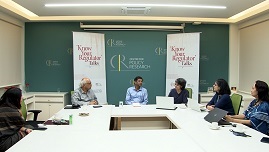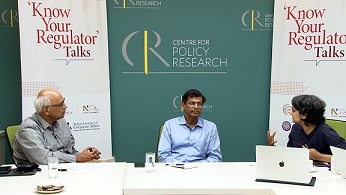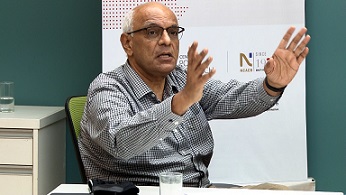 The IEPF Unit, NCAER in collaboration with The State Capacity Initiative at the Centre for Policy Research (CPR), the Forum of Indian Regulators (FOIR), and the Indian Institute of Corporate Affairs (IICA) organised this first event of the Know Your Regulator Series. The talk featured Dr M. S. Sahoo, Chairperson, Insolvency and Bankruptcy Board of India (IBBI) and Honorary Chairperson, Forum of Indian Regulators (FOIR) in conversation with Dr KP Krishnan, IEPF Chair Professor in Regulatory Economics, NCAER and Dr Mekhala Krishnamurthy, Senior Fellow, CPR and Director, State Capacity Initiative. The session, held virtually, is the curtain raiser to a series of sessions that will follow.
The IEPF Unit, NCAER in collaboration with The State Capacity Initiative at the Centre for Policy Research (CPR), the Forum of Indian Regulators (FOIR), and the Indian Institute of Corporate Affairs (IICA) organised this first event of the Know Your Regulator Series. The talk featured Dr M. S. Sahoo, Chairperson, Insolvency and Bankruptcy Board of India (IBBI) and Honorary Chairperson, Forum of Indian Regulators (FOIR) in conversation with Dr KP Krishnan, IEPF Chair Professor in Regulatory Economics, NCAER and Dr Mekhala Krishnamurthy, Senior Fellow, CPR and Director, State Capacity Initiative. The session, held virtually, is the curtain raiser to a series of sessions that will follow.
About the ‘Know Your Regulator’ Series
 The State Capacity Initiative at the Centre for Policy Research (CPR), the National Council for Applied Economic Research (NCAER), the Forum of Indian Regulators (FOIR) and the Indian Institute of Corporate Affairs (IICA) are pleased to announce a new talk series titled: ‘Know Your Regulator’ In this series, we will talk to the people entrusted with the task of regulating Indian markets and various parts and aspects of the economy. These are the chairpersons and members of India’s regulatory agencies.
The State Capacity Initiative at the Centre for Policy Research (CPR), the National Council for Applied Economic Research (NCAER), the Forum of Indian Regulators (FOIR) and the Indian Institute of Corporate Affairs (IICA) are pleased to announce a new talk series titled: ‘Know Your Regulator’ In this series, we will talk to the people entrusted with the task of regulating Indian markets and various parts and aspects of the economy. These are the chairpersons and members of India’s regulatory agencies.
In our conversations, we will seek to explore the public nature of regulatory activity. In other words, why should the work of regulatory agencies be of interest to people, as producers, consumers, professionals, service providers, and as citizens? What are the public goals of regulation? In what ways does the work of regulation involve having to make a balance, or to make trade-offs, or to amicably resolve competing or even conflicting claims of public and private interest?
 Regulatory agencies are a relatively recent innovation of the Indian state, set up to address the evolving needs of the Indian economy in the decades since the 1990s (although with some notable older instances). We are interested in exploring the institutional form of the regulatory agencies, their features, norms and values, and their frameworks of decision-making and rationality. We are also interested in the functional domain and the everyday administration of the regulatory agencies, their staffing, procedures, information systems and operational modalities.
Regulatory agencies are a relatively recent innovation of the Indian state, set up to address the evolving needs of the Indian economy in the decades since the 1990s (although with some notable older instances). We are interested in exploring the institutional form of the regulatory agencies, their features, norms and values, and their frameworks of decision-making and rationality. We are also interested in the functional domain and the everyday administration of the regulatory agencies, their staffing, procedures, information systems and operational modalities.
Regulatory agencies are envisaged as a state agency that can respond to complex and changing situations, both at the level of policy recommendation and in case-specific ruling. In the conception of regulatory agencies, this was thought of as a challenge that would be addressed through specialisation, expertise and in the design of their power and functions. However, each regulatory agency is also unique, in terms of the way in which its regulatory mandate is designed and the nature of the challenges that it is set up to address. In this talk series, we will seek to explore the regulatory debates (both broad and sectoral) that animate the world of regulation, and how it relates to the rest of us.






 The IEPF Unit, NCAER in collaboration with The State Capacity Initiative at the Centre for Policy Research (CPR), the Forum of Indian Regulators (FOIR), and the Indian Institute of Corporate Affairs (IICA) organised this first event of the Know Your Regulator Series. The talk featured Dr M. S. Sahoo, Chairperson, Insolvency and Bankruptcy Board of India (IBBI) and Honorary Chairperson, Forum of Indian Regulators (FOIR) in conversation with Dr KP Krishnan, IEPF Chair Professor in Regulatory Economics, NCAER and Dr Mekhala Krishnamurthy, Senior Fellow, CPR and Director, State Capacity Initiative. The session, held virtually, is the curtain raiser to a series of sessions that will follow.
The IEPF Unit, NCAER in collaboration with The State Capacity Initiative at the Centre for Policy Research (CPR), the Forum of Indian Regulators (FOIR), and the Indian Institute of Corporate Affairs (IICA) organised this first event of the Know Your Regulator Series. The talk featured Dr M. S. Sahoo, Chairperson, Insolvency and Bankruptcy Board of India (IBBI) and Honorary Chairperson, Forum of Indian Regulators (FOIR) in conversation with Dr KP Krishnan, IEPF Chair Professor in Regulatory Economics, NCAER and Dr Mekhala Krishnamurthy, Senior Fellow, CPR and Director, State Capacity Initiative. The session, held virtually, is the curtain raiser to a series of sessions that will follow. The State Capacity Initiative at the Centre for Policy Research (CPR), the National Council for Applied Economic Research (NCAER), the Forum of Indian Regulators (FOIR) and the Indian Institute of Corporate Affairs (IICA) are pleased to announce a new talk series titled: ‘Know Your Regulator’ In this series, we will talk to the people entrusted with the task of regulating Indian markets and various parts and aspects of the economy. These are the chairpersons and members of India’s regulatory agencies.
The State Capacity Initiative at the Centre for Policy Research (CPR), the National Council for Applied Economic Research (NCAER), the Forum of Indian Regulators (FOIR) and the Indian Institute of Corporate Affairs (IICA) are pleased to announce a new talk series titled: ‘Know Your Regulator’ In this series, we will talk to the people entrusted with the task of regulating Indian markets and various parts and aspects of the economy. These are the chairpersons and members of India’s regulatory agencies. Regulatory agencies are a relatively recent innovation of the Indian state, set up to address the evolving needs of the Indian economy in the decades since the 1990s (although with some notable older instances). We are interested in exploring the institutional form of the regulatory agencies, their features, norms and values, and their frameworks of decision-making and rationality. We are also interested in the functional domain and the everyday administration of the regulatory agencies, their staffing, procedures, information systems and operational modalities.
Regulatory agencies are a relatively recent innovation of the Indian state, set up to address the evolving needs of the Indian economy in the decades since the 1990s (although with some notable older instances). We are interested in exploring the institutional form of the regulatory agencies, their features, norms and values, and their frameworks of decision-making and rationality. We are also interested in the functional domain and the everyday administration of the regulatory agencies, their staffing, procedures, information systems and operational modalities.